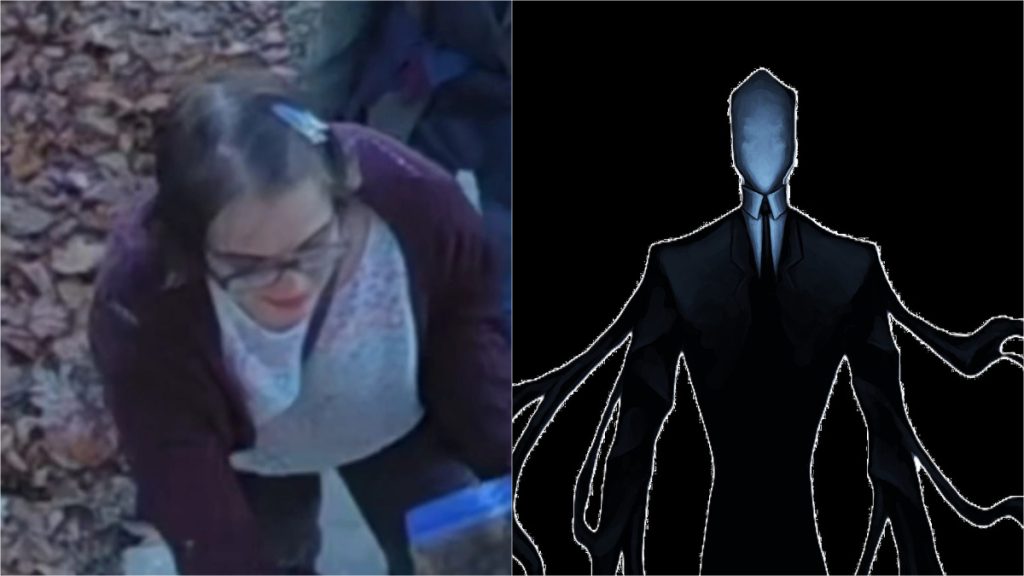The state of Wisconsin failed to notify Morgan Geyser’s victim Payton Leutner and her family that the Slender Man attacker was on the run, the Waukesha County District Attorney revealed Monday, as outrage grew over the state’s handling of the escape.
“No one did contact them,” DA Lesli Boese said, adding that Geyser was in the custody of the state Department of Health Services. “I would have expected that the Department of Health Services would have contacted them to let them know,” she said on Monday.
“I was informed yesterday morning (Sunday) about Ms. Geyser escaping from her placement,” she said. Boese’s office’s victim/witness coordinator immediately “contacted the victim and her family to make sure they knew about it. They didn’t know anything about it. We wanted to make sure they were safe and had a plan in place.”
At 12:20 p.m. Monday afternoon, “they still had not been informed by any agency other than our own that she had escaped,” said Boese. “We were very concerned about the safety of the victim and her family as well as our community.”
Boese said her office was first contacted by Madison police that Geyser was on the run. That was at least 12 hours after the state first received an alert from Geyser’s electronic monitoring bracelet, which she cut off before fleeing a Madison group home.

The failure to notify Geyser’s victim in the high-profile case is just one of a series of alleged failures by the state DHS and Department of Corrections.
The state of Wisconsin has had a series of egregious failures regarding victims’ rights in recent years. Attorney General Josh Kaul’s office botched a federal audit response into his office of crime victims’ services, imperiling sexual assault and domestic violence grants throughout the state. Kaul didn’t respond to an open records request for 1.5 years. And the state Department of Corrections systemically failed to notify victims and their families of paroles and parole hearings involving some of the most brutal murderers in state history.
The state Department of Health Services and Department of Corrections are both agencies under the control of Gov. Tony Evers, whose appointees are in his cabinet.
The state Department of Health Services alleged to WRN, “We can confirm that, as it relates to the client for whom a warrant was issued at approximately midnight on November 23, 2025, DOC worked urgently to seek a nationwide extraditable warrant as soon as possible, in partnership with Waukesha County law enforcement.”
However, Boese, the Waukesha County sheriff, and the City of Waukesha Police Department all say they weren’t notified until the morning after Geyser escaped, more than eight hours after the midnight apprehension request. Furthermore, they were notified by Madison police, not the state.
And Madison police said DHS never relayed its apprehension order to them; that agency first learned Geyser was missing just before 8 a.m. Sunday, when a woman at the group home called 911. Boese also said that an intake judge was involved in signing the warrant, but that came Sunday night.

However, it’s the delay in alerting the victim and her family that most concerns Boese, the prosecutor in the community where Geyser stabbed Payton, then 12, 19 times as a result of an infatuation with a fictional horror character called “Slender Man,” while another pre-teen girl watched. A mental disease or defect finding sent Geyser to a psychiatric hospital instead of prison, before she was released early into the group home, despite an attempt to revoke her release previously by both prosecutors and DHS. According to WKOW, neighbors of Yoyo Quality Care on Kroncke Drive in Madison were not notified, either, that Geyser was staying there before she fled by allegedly cutting off an electronic monitoring bracelet.
The Department of Health Services says on its website that the agency “manages victim notification for people found not guilty by reason of mental disease or defect.”
According to DHS, notifications are sent to enrolled victims when:
- “A court grants conditional release to the community.”
- “A court grants discharge from conditional release.”
- “A court grants discharge from the facility to the community.”
- “A not guilty by reason of mental disease or defect commitment expires.”
The notification requirements are handled by Wis. Stat. § 971.1.
Geyser was arrested on Sunday night in Posen, Ill. Posen police said they found her sleeping on a sidewalk outside a truck stop with a man and allege she initially gave a false name before telling authorities to “Google” her. The man “was charged with criminal trespass and obstructing identification for giving a false name. He was later released,” NBC Chicago reported.
In custody pic.twitter.com/wW04pJS1WE
— Wisconsin Right Now (@wisconsin_now) November 24, 2025
The man was identified as Chad Mecca, 43, but he told WKOW that he goes by the name “Charly.” Geyser’s mom posted, and then deleted, a photo of Charly to her Facebook page. Mecca told WKOW that he and Geyser took a bus to Posen and wanted to “get as far away as they could.”
Geyser allegedly told police that she met Mecca “a couple of months earlier at Good Shepherd Church. She told authorities the group home would not allow Mecca to visit her, so he would sneak in through her window to see her,” WTMJ-TV reported, adding that Geyser admitted cutting off the bracelet with scissors and then taking a Greyhound bus with Mecca to Posen.
“Due to her being mistreated at the group home and him not being able to visit her, they both decided to run away from the group home,” the police report stated.
According to Wisconsin court records, a 43-year-old Chad Mecca has a restraining order against him and a previous forfeiture for disorderly conduct, domestic violence-related.
A State Legislator Is ‘Furious’ About the Delays
The delays are outraging legislators.
“To say I am furious about the circumstances surrounding this escape would have to be the understatement of the year,” said state Rep. Barbara Dittrich (R-Oconomowoc.) “I have already been in touch with the Waukesha County DA to see how we can prevent a situation like this from ever happening again. However, the Wisconsin Department of Corrections and Department of Health Services have some MAJOR explaining to do as to why they dropped the ball on notifying local law enforcement and the victim’s family immediately when they knew of her escape.”
WRN wrote DHS and asked which “Waukesha County law enforcement” they “worked urgently to seek a nationwide extraditable warrant” with “as soon as possible,” in DHS’s words.

slender man photo is from wikimedia commons.
It wasn’t the Waukesha Police Department.
“We were contacted by the City of Madison Police Department yesterday morning to assist them with located the crime victim and her family. Outside of those communications we were not contacted by DOC or DHS,” said Capt. Dan Baumann, of the Waukesha Police Department, to WRN. “I apologize for the limited response but that was our involvement.”
It wasn’t the Waukesha County Sheriff. “We were notified during the day yesterday from Madison police that she had walked away from the group home,” said Waukesha County Sheriff Eric Severson. Madison police wrote previously that they learned Geyser was missing at 7:58 a.m., almost eight hours after DOC issued the apprehension request, which “was never relayed to the Madison Police Department.”
Boese said that any criminal charges associated with the escape would unfold in Dane County, which is where Geyser lived. A decision on whether to file a petition to revoke her supervised release would be the decision of DHS, said Boese, and she added she would strongly support it. In fact, Boese argues that Geyser should have never been released in the first place, and she noted that a prosecutor in her office, Abbey Nickolie, “vehemently” argued in court against the release.
In a statement, the state DHS also indicated that the agency wanted Geyser revoked last spring.
“In Wisconsin, individuals who are found not guilty due to mental disease or defect are committed to the custody of DHS. Additionally, under state law, those individuals have the right to petition the court for release every six months,” wrote DHS. “Based on publicly available court records and documents, Geyser was previously granted conditional release. Publicly available court records show DHS sought revocation of conditional release before she was placed in the community.”
“However, the revocation documents filed by DHS were sealed by the court. DHS is also limited in discussing the case by the privacy laws noted above. Accordingly, DHS is not able to share further details about the decision to seek revocation. A judge ultimately denied DHS’s request for revocation,” wrote DHS.
“Individuals who are part of the conditional release program remain in DHS custody. DHS contracts with the Wisconsin DOC to have trained probation and parole agents supervise clients in the community on behalf of DHS. When a patient treated at one of our facilities is released with specific conditions, DHS contracts with the Wisconsin Department of Corrections (DOC) to conduct supervision and monitoring activities on behalf of DHS,” DHS wrote. “In such situations, because the DOC is an agent of DHS, DOC is similarly bound by many of the same.” (DHS was responding to a series of questions that WRN forwarded to DOC.)
Added DHS: “In cases where GPS monitoring is ordered for patients on conditional release from a DHS facility, the GPS device is monitored through DOC’s electronic monitoring center. This is how individuals under DOC supervision are monitored, as well. Importantly, not all alerts the department receives from devices are the result of tampering or because an individual has absconded. A device may also alert, for example, if the device has any technological issue.”
“When the monitoring center receives an alert that a device is not functioning correctly or may have been tampered with, the monitoring center makes efforts to try to resolve the alert and attempts to contact the client,” DHS wrote. “As part of its standard process when a device alerts, DOC immediately begins to attempt to reengage the GPS monitoring device. If the device cannot be brought back online, continues to malfunction and the client cannot be reached, the monitoring center takes steps to locate the individual. This includes making contact with the facility where the person lives, the individual’s agent, issuing an apprehension request (also known as a warrant) and contacting law enforcement.”
Madison police previously released this timeline:
Geyser was last seen at a group home at around 8:15 p.m. on Saturday.
Around 9:30 p.m., the Department of Corrections received an alert that Geyser’s GPS monitoring bracelet was malfunctioning.
Around 11:30 p.m., DOC made contact with the adult group home where Geyser was living.
Around 11:35 p.m., group home staff informed DOC that Geyser was not at the home and that she had removed her GPS bracelet.
Around midnight, DOC issued an apprehension request for Geyser. This request was never relayed to the Madison Police Department.
At 7:46 a.m., someone from the group home called 911 to report Geyser as a missing person.
At 7:58 a.m., Madison police was assigned to the call and headed to Kroncke Drive. This was the first time the Madison Police Department was made aware that Geyser was missing.
“This is an approximate timeline, and information is subject to change as the investigation unfolds,” Madison police noted.
Table of Contents






![Author Exposes the Tragic Realities of the 2020 Riots & the ‘Gaslighting of America’ [REVIEW] julio roses](https://www.wisconsinrightnow.com/wp-content/uploads/2025/11/MixCollage-21-Nov-2025-02-08-PM-8145-218x150.jpg)
















